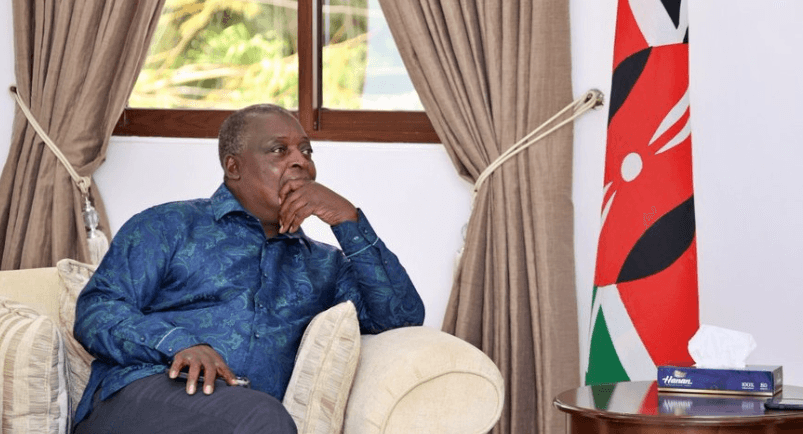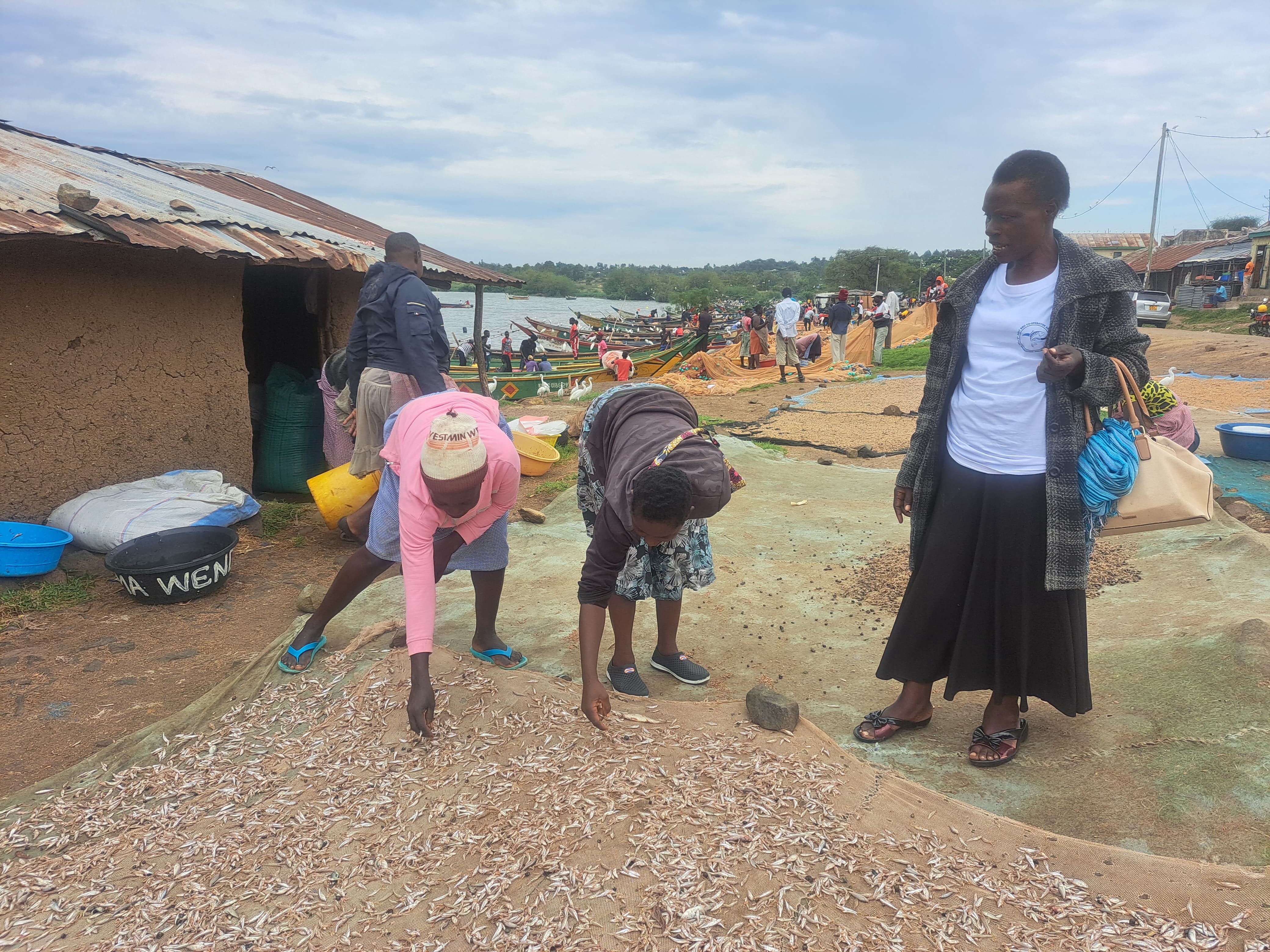
On the shores of Lake Victoria, at Asat beach in Seme, Kisumu county, a quiet revolution is unfolding. Women are breaking cultural barriers to step into leadership roles and claim their position in the fishing industry.
Long sidelined in the male-dominated fishing industry, the women are now steering boats, owning vessels and shaping the future of fishing on Lake Victoria.
Located 15km from Kombewa market, the beach bustles with early morning activities.
The sun casts long shadows of fishermen unloading their catches while groups of women oversee the operations with keen eyes.
Here, women are venturing in the trade and thriving, challenging traditional gender biases while supporting their families and uplifting their communities.
Hellen Atieno, 35, is one of the trailblazers. As the sole breadwinner of her family, she has learned to assert authority, navigating not only the treacherous waters of Lake Victoria for 12 hours but also the deep-seated gender biases that have long kept women from taking leading roles in the industry.
Her husband, also a fisherman, struggles to provide, leaving her to shoulder the financial burden.
Atieno is a mother of seven. The firstborn, aged 18, is in high school, while the lastborn is in nursery.
SURVIVING THE WATERS
At 6pm every evening, Atieno sets out with her crew, steering her boat through the night until she returns back around 6 or 7am the next day.
"I'm the one driving the boat, " she says proudly. Her two male crew members follow her lead, taking instructions as she navigates.
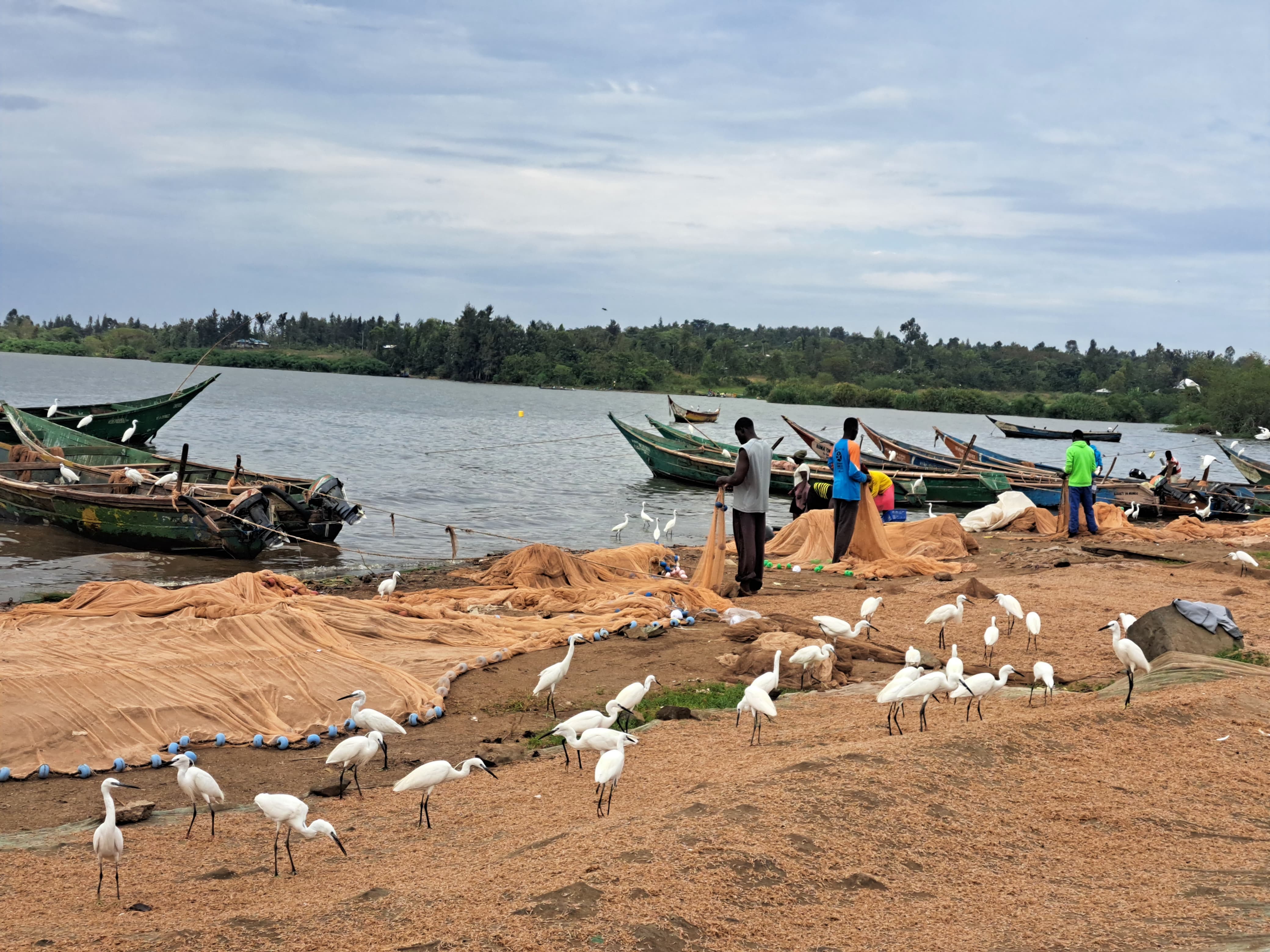
Fishing has
its dangers. The unpredictable weather on Lake Victoria can turn tragic, with
strong winds and storms threatening to overturn the boats.
Some nights, when she sees the situation getting worse, Atieno sails to the shores of Ndere Island, where she stays until the weather calms down because it is not safe to continue sailing when the wind is high.
Beyond the natural challenges, Atieno says sexual advances from the male crew are common in the industry, but she always stands firm.
"I tell them to focus on the work. If anyone tries nonsense with me, I kick them out of my crew and can never work with them.”
Despite the hardships, fishing has provided Atieno with a livelihood. On good days, she makes around Sh7,000, with Sh4,300 going to the boat owner and the rest split among the crew.
"Fishing is not just a means of living but also a lifeline for my family," she says.
“When I go to the lake to fish, that's when I can put food on the table for my family and even pay school fees for the children.”
Atieno dreams of owning her own boat one day, even though her husband disapproves of her involvement in fishing. On the side, she also rides boda boda to complement what she gets from the lake
WIDOWHOOD TO OWNERSHIP
At the same beach, Everline Juma, a 38-year-old widow, has the same fighting spirit but a different story. Widowed in 2017, Juma's journey to the industry began after the death of her husband.
Left to take care of her four children, with the youngest being two months old, Juma knew she had to find a way to fend for herself and her family.
Her husband had been a fisherman. However, with little knowledge on fish trading, she began selling fish on commission, earning small amounts that barely sustained her household, but she dint give up.
She saved every coin, eventually opening a small hotel at the beach while also selling clothes.
In 2021, after years of saving, Juma bought her first boat, spending Sh800,000 on the entire set-up.
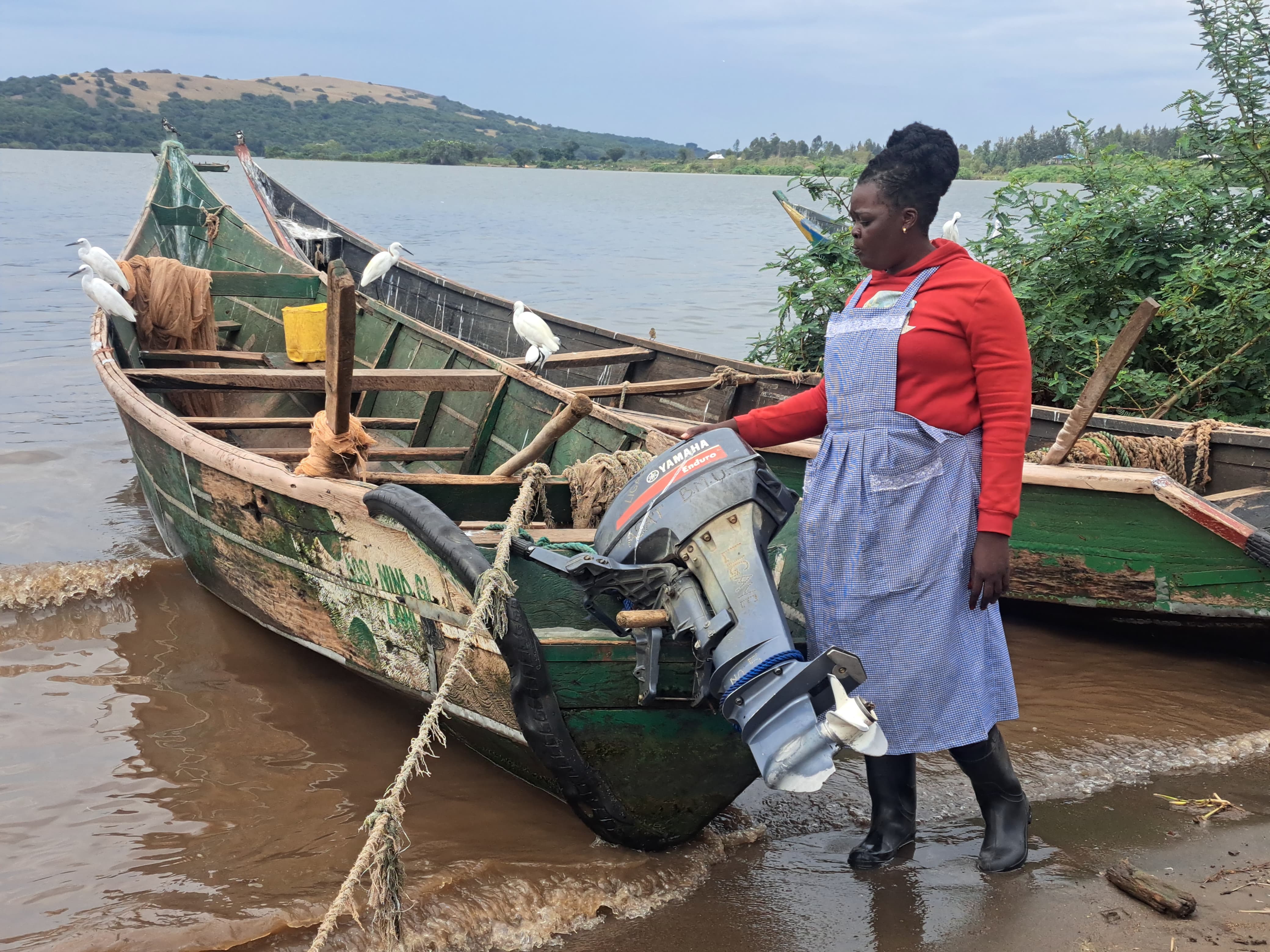
Today, she owns four boats and her children are in college and secondary school.
Standing next to her boat with eyes scanning the bustling activities around her, she said, "The struggle was real but through determination, I am here today."
Juma's boat brings good income on some days, but just like Atieno, she finds the fishing industry unpredictable.
"Sometimes you get good catches, at times small or nothing at all, but you have to keep going," she said.
Owning a boat as a woman in Kenya is not easy. It comes with its own challenges, including hefty fines imposed by officials.
Many women face harassment, sexual exploitation and discrimination on the waters and at the shores, Juma said.
But with more women joining the industry, there is hope that these outdated attitudes will shift.
"As a woman you have to be strong and stand your ground," Juma said, adding that they are no longer waiting on the sidelines but staking their claim.
Today, she runs her own boat, employing other women and men and helping them achieve financial independence just like she did.
Ken Ouma, also a fisherman, says fishing on Lake Victoria was once a male domain, but the fishing industry is now transforming as women slowy stamp their authority.
He said their determination and fresh perspective could enhance the community, adding that it's time they all embrace this change and support their efforts.
"Women owning boats and hiring men is a game changer. It fosters a more inclusive environment and is a clear indication that every contribution is valued. The collaboration is refreshing," he said.
“A strong fishing community benefits everyone. Change is long overdue."
LEADING WOMEN'S CHANGE
Teresa Aloo is the first woman to hold the Beach Management Unit (BMU) chairperson position across Kisumu county's 35 beaches, a role traditionally held by men.
Aloo is the chair of Asat BMU, where 20 out of the 100 boats are owned by women.
Her leadership has been a game-changer, especially for women in the fishing industry.
"Previously, women were seen as incapable of handling leadership in the fishing sector, but women empowerment has changed that,” she said.
Aloo’s work speaks for itself. She has lobbied for improved infrastructure, ensuring better roads and safety measures for fisherfolk.
She owns a boat and understands the struggles women face in the industry.

Luo Council of Elders deputy organising secretary Jotham Ajiki says the role of women in the Luo society has developed significantly.
Traditionally confined to their homes, they are now taking up leadership and venturing into male-dominated fields like fishing.
Ajiki credited pioneers like Grace Ogot for paving the way for today's women leaders.
Kenya Female Advisory Organisation executive director Esther Achieng sees a promising future for women in fishing. She advocates gender equality in the sector.
Historically marginalised and confined to roles like fish processing, women are now moving up the value chain, shifting from simply selling of fish to owning boats, managing crews and leading BMUs.
Achieng says cage fish farming has been a critical turning point for many women. Owning the cages allows them to control their fish production without depending on male fishermen generating steady incomes and employing others.
Its
popularity (cage farming) in Kenya is increasing, especially in Lake Victoria.
In 2020, there were more tha 2,500 fish cages spread across counties bordering
the lake, namely Kisumu, Siaya, Homa Bay, Migori and Busia.
Achieng said women gaining control over resources and profits has reduced exploitative practices, such as ‘sex for fish’, which exposed women to violence and HIV infection.
"Today we see women as boat owners, fish cage operators and key players in all sectors of the blue economy," she said.
She said this transformation results from several empowerment initiatives that have helped women overcome barriers in the industry.
Their participation now extends beyond the water into other spaces in the blue economy, such as fish processing, packaging and providing low-cost housing for fisherfolk.
She added that programmes like table banking, where women pool resources to offer low-interest loans, have also empowered many to invest in boats and fish cages, turning them into employers.
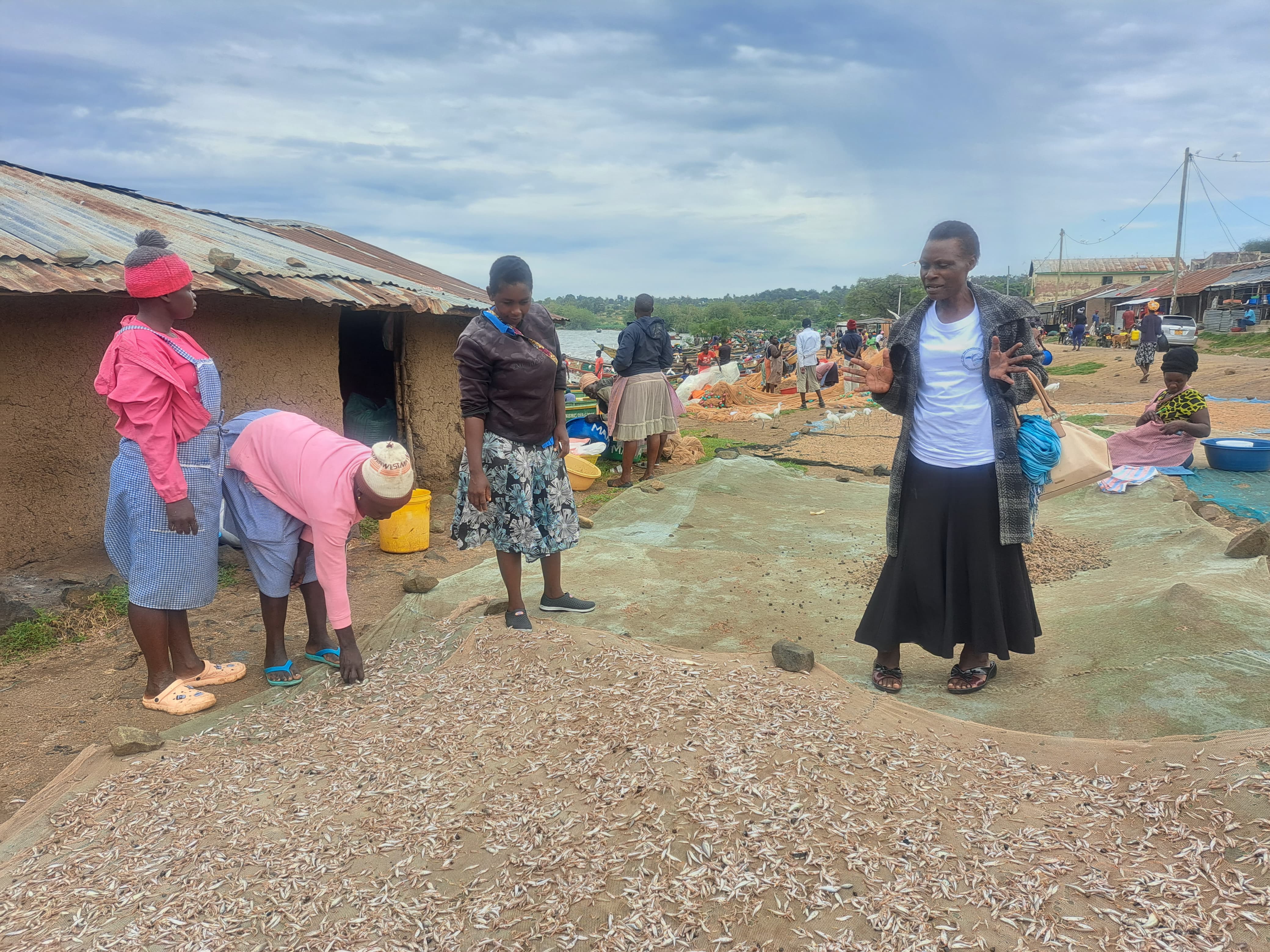
"Women can now participate fully in the blue economy, including fishing, aquaculture, cage farming and even eco-friendly tourism around the lake,” Achieng said.
However, the blue economy is not without its challenges, particularly in terms of gender dynamics.
Achieng said women still face barriers such as confiscation of boats and discrimination in cross-border trade.
"We must ensure that women in the sector are aware of their legal rights and can engage with policymakers to protect their investments," she said.
Achieng called for gender-sensitive policies to promote fair treatment in the blue economy.
"The government has a responsibility to ensure that women have access to opportunities in the blue economy,” she said.
“By supporting women to take leadership roles, engage in policy advocacy and access funding, we can create an industry that is sustainable, just and free from gender-based violence.”
She concluded that the rise of women in the industry is a testament to their resilience, determination and ability to break through societal barriers.
How gender balance will change industry
The increasing involvement of women in fishing in Lake Victoria will be transformative, an industry leader has said.
Beach Management Unit (BMU) Network Kenya national chair Tom Guda expressed confidence that their participation will foster a more balanced and resilient sector.
Guda says with the introduction of cage fish farming, women are stepping into roles previously dominated by men, reshaping the value chain and redefining the fishing business.
He sees this as an opportunity to dismantle the long-standing male dominance in fishing.
"We are looking at an industry where women will play a critical role across the entire value chain," he said.
“With cages coming on board, we see a serious long-term opportunity for women to engage in the business of fishing at a higher level, including boat ownership and decision-making.”
The shift is significant because when women own boats, they gain control over how the business is run.
Guda says many women on the island of Lake Victoria are already investing seriously.
His vision is to spread this empowerment across the lake, ensuring women not only enter the fishing industry but also thrive as leaders and business owners.
He said financial discipline is a key area where women need support.
BMU Network Kenya, along with its partners, is committed to helping women develop the skills necessary to manage their finances effectively.
"We will continue working with partners to support women, especially on the aspect of financial discipline," Guda said, adding that this financial support is crucial to helping them avoid unnecessary expenditure and instead plan to invest.
He says this is different with many men in the industry, whose earnings often go towards non-essential expenses.
"Women who own boats are demonstrating serious investment habits, focusing on long-term growth and stability, setting a positive example for the broader fishing community," he said.
Guda said they are committed to creating an environment where women can campaign, share their agendas and rise to leadership positions within the network.
He said for BMU Network Kenya, the goal is to see women in key decision-making roles within the BMUs because having women in these positions is healthy for the fisheries sector, particularly when it comes to issues like conservation.
"When you talk about conservation with mothers, they understand much faster", he said, noting the unique perspectives women bring to the table.















